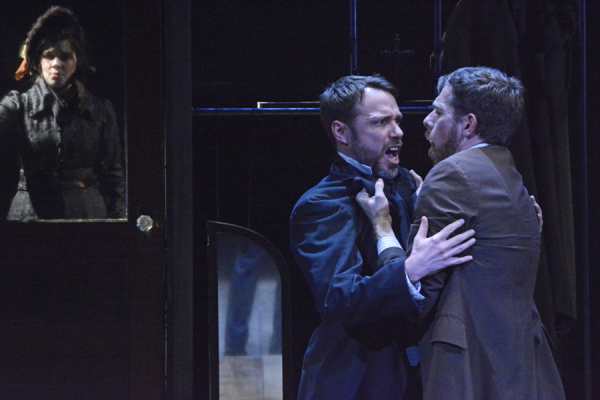Slow Dusk & Markheim

(© Tina Buckman)
A double bill of Gothic operas might not be your first impulse when weighing what shows to see this holiday season, but you should really consider the Little Opera Theatre of NY and its presentation of American composer Carlisle Floyd's two short operas, Slow Dusk & Markheim, at 59E59 Theaters. Highly disparate in location and period, the two works make it clear that gloom and doom are to be found the world round (much like Santa Claus).
First performed in 1949, Slow Dusk (Floyd's first opera) takes place on an uncommonly hot day in May in the rural Carolinas. Aunt Sue (Janice Meyerson) frets to Jess (Robert Balonek) about his sister, Sadie (Carolina Castells). She's worried Sadie wants to marry Micah (John Kaneklides), the son of a neighboring family she considers too poor. But Sadie can't see how her family is any better. "We're all poor," she sings with a house-shaking vibrato. An operatic catfight ensues as things go from bad to worse in this Southern Gothic downer.
Castells (who has previously portrayed the title character in Floyd's most popular opera, Susannah) brings a raw vocal power to the role that is magnificent to experience in the relatively cozy confines of 59E59's main stage. Unfortunately, this comes at the cost of efficient phrasing and clear diction. It is often difficult to understand Floyd's lyrics when she sings them. Not so with Kaneklides, who endows each syllable with crystal-clear perfection.
Inessa Zaretsky's chamber orchestration manages to capture the sweeping strings and sweltering woodwinds of Floyd's score. You actually feel the heat as the performers fan themselves. Raymond J. Lustig's orchestration of the second opera in the program, Markheim, is not nearly as successful. An occasional hollowness in the sound makes one keenly aware that this score was written for a larger orchestra than the one flanking the playing space.
Still, Markheim is the more dramatically satisfying of the two, signifying Floyd's evolution as a dramatist. It also surely helps that the libretto is an adaptation of the Robert Louis Stevenson story of the same name. Unlike the often meandering Slow Dusk, Markheim is chock-full of suspense and intrigue.
The scene opens in the shop of antiques dealer Josiah Creach (Brent Reilly Turner). This being Victorian London, a group of street carolers (conveniently played by the cast of Slow Dusk) sings a minor and foreboding Christmas song, the very antithesis of the cheery ditties performed by every Salvation Army bell-ringer outside Duane Reade. Scrooge that he is, Creach shoos them away. He's more welcoming of Markheim (Tyler Putnam), the scion of an ancient and wealthy family. Because of his own bad choices, Markheim has fallen on hard times and has been forced to pawn off his family's possessions, many of which are currently on display in Creach's shop. Markheim is desperate to sell one more item (of dubious origin), but Creach becomes hostile when Markheim makes a pass at his maid, Tess (Angela Mannino). The two men engage in a whiskey- and fear-fueled showdown.
Putnam is brilliant as Markheim, filling the role with his robust and resonant bass. Tenor Matthew Tuell makes a surprise appearance as a black-clad stranger, a part made all the more eerie by his casual resemblance to Putnam. Tuell's presence is simultaneously impish and deeply unsettling. This opera is like A Christmas Carol meets The Twilight Zone.
Set designer Neil Patel resourcefully creates Creach's shop, completely with dusty mirrors, candlesticks, and a grandfather clock. Properties designer Andrew Jordan does an excellent job of providing plausible versions of the artifacts Floyd specifically (somewhat cruelly) mentions in his libretto. Lara De Bruijn's period costumes are a visual feast. Markheim's well-tailored brown suit and matching Inverness cape is particularly eye-catching and tells the story of a man living well beyond his means.
Maestro Richard Cordova leads the chamber orchestra with a fine sense of tempo and balance. While the orchestra never overpowers the vocalists, its dynamic nuance ends there, with every instrument seeming to float along at a comfortable (but bland) mezzo piano. We get a sense of Floyd's score, but know it could be so much more. Thankfully, that doesn't do anything to blunt the tonal efficacy of either piece.
By pairing Slow Dusk and Markheim, director Philip Shneidman gives us a heaping helping of Floyd's Gothic proclivities, with a side of Christmas. The composer has a distinctively American sound and an acute sense of the tragic and macabre. It may not be the obvious choice for a December's eve in the theater, but it's one absolutely worth making.











